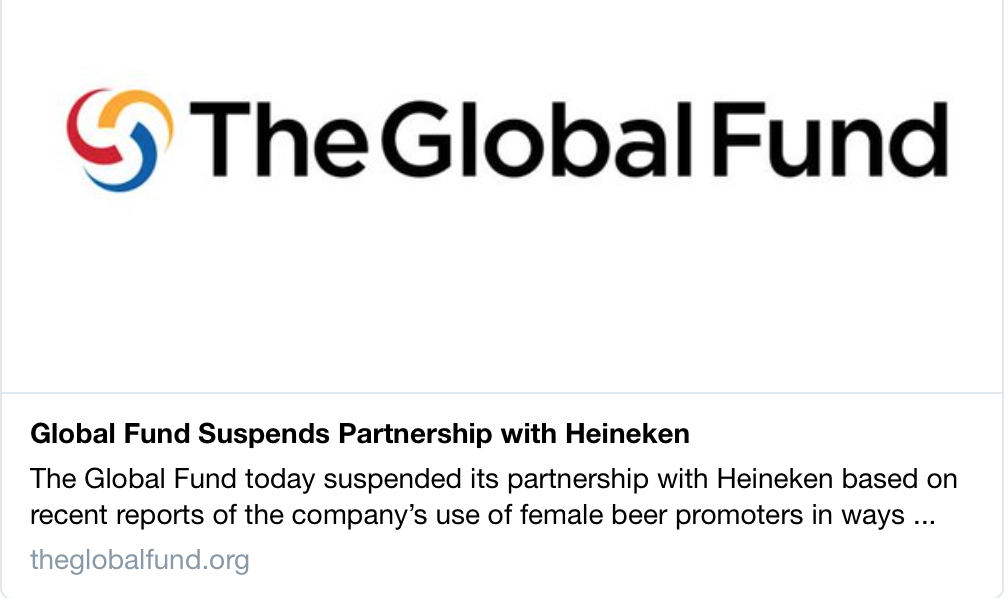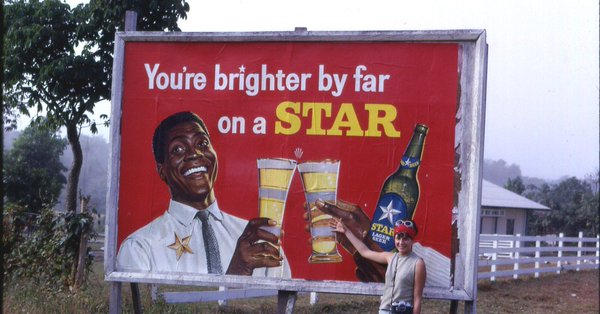
Yesterday, 29th March, the Global Fund announced that it was suspending (not rescinding, suspending) its partnership with Heineken. On the face of it, this should be grounds for celebration, but it’s only a partial victory.
The global public health community has opposed this partnership ever since it was signed off in January 2018 – the link may be dead by the time you read this post but don’t worry, here’s a screenshot (a safekeep to remind yourself just how dumb even clever people can be) :

Apparently unaware of Malawi’s National Alcohol Policy, launched in August 2017, which begins by noting that “the African Region is faced with a growing burden of harmful alcohol consumption and its disastrous effects. There is no other consumer product as widely available as alcohol that accounts for as much premature death and disability”, the Global Fund thought it would be a good idea to partner with Heineken. Newly appointed head of the Fund Peter Sands was delighted:
“We are particularly excited to leverage the expertise of HEINEKEN as we develop innovative tools and approaches that will promote HIV prevention and behaviour change. We also look forward to sharpening our logistics planning skills to better support our implementing partners’ efforts to deliver health services and commodities wherever they are needed. These two efforts are vital to improving health and well-being in Africa.”
Robert Marten and Ben Hawkins were in no doubt what was really going on, and said so in their 9th February correspondence to the Lancet:
“It is clearly an attempt by the alcohol industry to market partnerships with key global health actors to reframe themselves as part of the solution instead of the problem”
Twitter then went berserk, with pretty much every corner of public health weighing in to denounce this toxic partnership. Robert Marten penned it best with his phrase ‘partnering under the influence‘ to describe this dubious, and increasingly grimy practice. Why, asked Michael Thorn, would the Global Fund partner with an industry that could come up with billboards like this:

Jaws began to drop all over the world – is the Global Fund actually partnering with the alcohol industry, that’s the al-co-hol industry?! Isn’t there an oversight mechanism, or a code of conduct, or just a friend that could have said to Sands – you know what, let’s not do that. Apparently not. Sands was facing his ‘Mugabe Moment’ – that moment when you do something that seemed like a good idea at the time, but actually wasn’t. Crucially, however, when the criticism comes, you take a step back, reflect, and do the right thing – concede the error, apologies, and move on. Dr Tedros did that after his monumental gaff of appointing Robert Mugabe as one of WHO’s goodwill ambassadors (yes, he really did make that appointment), but gained kudos for doing so. Sands did not do that, isn’t doing that; in fact, he’s making the matter worse, even now.
The Heineken debacle took a couple of novel turns last week, one with the almost Onion-esque charge by Chance the Rapper that Heineken was racist because of its lager tagline “sometimes lighter is better”; the other, an accusation that Heineken ‘promotional girls’ working in bars and cafes in various African countries were being sexually assaulted during their work.
This was too much for the Global Fund, leading to its statement yesterday: “The Global Fund today suspended its partnership with Heineken based on recent reports of the company’s use of female beer promoters in ways that expose them to sexual exploitation and health risks”.
Good news? Well, yes and no. Helen Clarke was not the only person on Twitter today to make an obvious point:

And later this morning, Clark tweeted: “Exactly right. The Board should take the opportunity to close down the partnership”. And so it goes on, with public health professionals fuming at the Fund’s inability or unwillingness to join the dots between Heineken…Alcohol…ill-health (in all its permutations – illness, social determinants, gender).
Take your pick from just a small sample of tweets: Charles Parry “I agree …suspending the partnership till @GlobalFund gets a suitable response from @Heineken does not nearly go far enough .. practices of #BigAlcohol are antithetical to HIV & TB prevention”;
Robert Marten “Of course! @GlobalFund and @PeterASands need to sober up, terminate the partnership and commit to stop partnering under the influence. Moving forward, any new partnerships needs to be SDG compatible. This must happen before replenishment”;
Lucy Westerman “Agree. The door has been left ajar for the partnership & there is much more than the cited issue that gives grounds for termination. A window of opportunity for the Board to assert concerns during the suspension, & for GF to revise partnership policies & be a model for others”;
And Pam Das’ cautionary note “Good news, but according to press release, suspension refers to impropriety by female promoters, not to concerns raised by GH community about partnering with Heineken. I’d be cautious thinking this fight is won. Though I hope to be proven wrong!”
So what next? Breaker-of-the-news Benjamin Meier offered this suggestion: “With the @GlobalFund suspending its partnership with @Heineken, it is necessary to have a larger debate about TNC engagement in #GlobalHealth governance (across organizations), developing rules to limit corporate partnerships that undercut #PublicHealth”. That debate cannot come too soon. Unfortunately, the head of the Global Fund has been almost mute over this whole sorry episode, which does not augur well.
More optimistically, Anders Nordstrom tweeted earlier “We have requested the board’s ethics and governance committee to review the @GlobalFund partnership policy and they have agreed to do so @PeterASands @UlrikaModeer @HelenClarkNZ @MartenRobert”.
Let’s hope the Fund acts on that request, and in doing so remembers that it is not just a financing partnership but a public health partnership too.
Andrew
One comment on “Ladies and gentlemen, Heineken has now left the building (or has it?)”